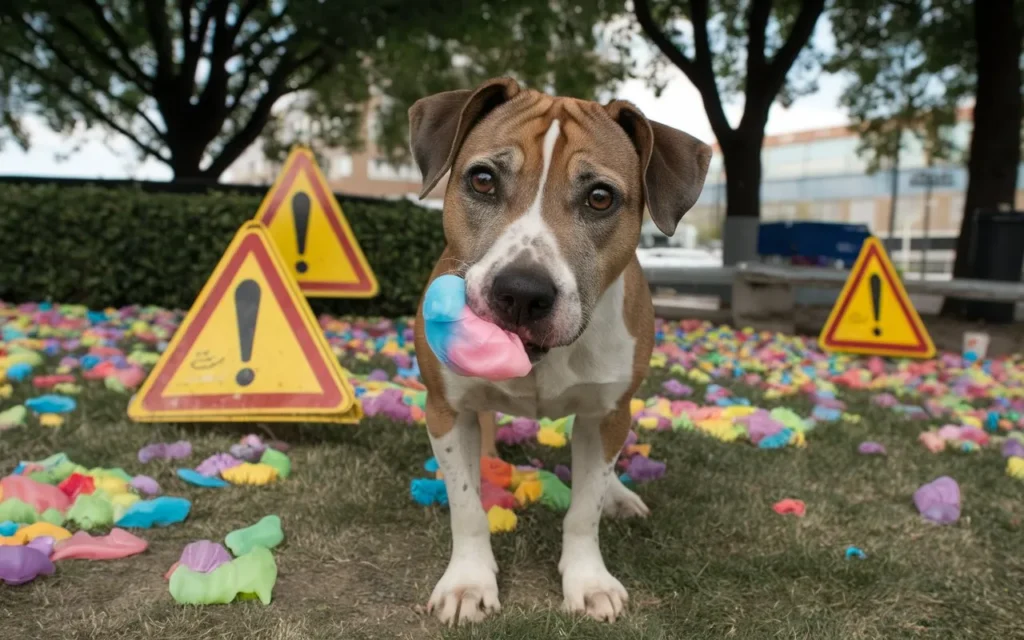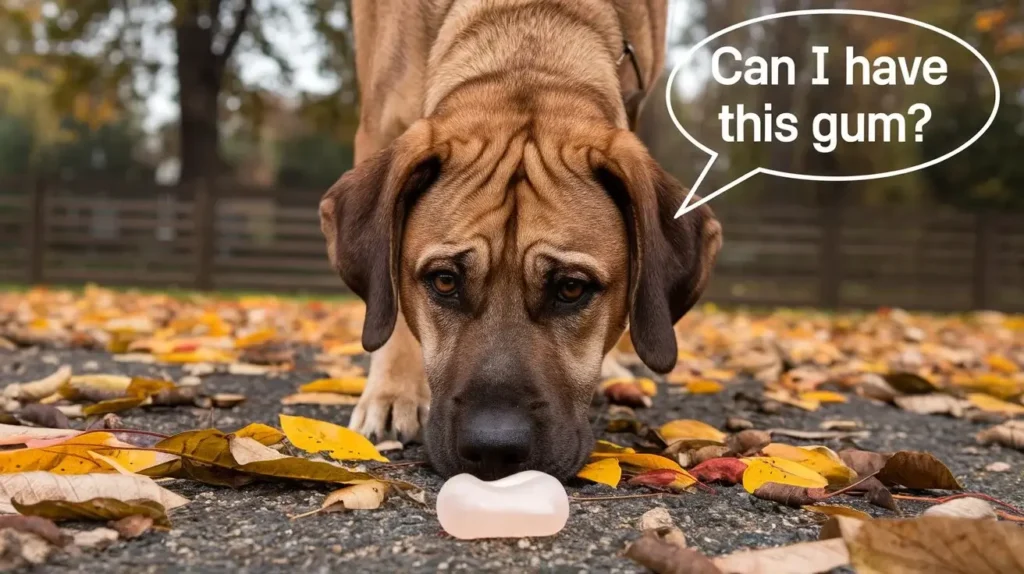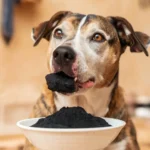As a responsible dog owner, you’ve probably wondered, “Can dogs have gum?” It’s a crucial question that deserves a thorough examination. In this comprehensive guide, we’ll explore everything you need to know about dogs and gum, including different types of gum, potential risks, and alternatives for maintaining your furry friend’s oral health.
Understanding the Risks: Can Dogs Have Chewing Gum?
When it comes to canine health, the question “Can dogs have chewing gum?” is a common concern among pet owners. The short answer is no, dogs should not have chewing gum. Here’s why:
- Xylitol toxicity: Many sugar-free gums contain xylitol, an artificial sweetener that’s extremely toxic to dogs. Even small amounts can cause rapid insulin release, leading to hypoglycemia (low blood sugar) and potentially liver failure.
- Choking hazard: Chewing gum can easily become lodged in a dog’s throat, posing a serious choking risk.
- Digestive issues: If swallowed, gum can cause blockages in the digestive tract, leading to severe complications.
- Artificial ingredients: Many gums contain artificial colors, flavors, and preservatives that may be harmful to dogs.
Given these risks, it’s clear that the answer to “Can dogs have chewing gum?” is a resounding no. As a responsible pet owner, it’s crucial to keep all types of gum out of your dog’s reach.
The Truth About Xanthan Gum: Can Dogs Have Xanthan Gum?
While exploring gum-related topics, you might also wonder, “Can dogs have xanthan gum?” This question requires a more nuanced answer.
Xanthan gum is a common food additive used as a thickener and stabilizer in many human and pet foods. Unlike chewing gum, xanthan gum is generally considered safe for dogs in small amounts. However, there are a few considerations:
- Digestive sensitivity: Some dogs may experience mild digestive upset when consuming products containing xanthan gum.
- Quantity matters: While small amounts are typically safe, large quantities of xanthan gum could potentially cause digestive issues.
- Not a dietary necessity: Dogs don’t need xanthan gum in their diet, so it’s best to limit their exposure to it.
If you’re concerned about xanthan gum in your dog’s food, consult with your veterinarian. They offer tailored recommendations that cater to your dog’s unique health conditions and nutritional needs.
Exploring Alternatives: Can Dogs Have Guar Gum?
As we delve deeper into gum-related substances, you might ask, “Can dogs have guar gum?” Like xanthan gum, guar gum is a common food additive used as a thickener and stabilizer.
Guar gum is typically regarded as safe for dogs when consumed in limited quantities. It’s commonly included in many commercial dog foods and treats. Nevertheless, there are some important considerations to keep in mind:
- Digestive sensitivity: Some dogs may experience mild digestive upset when consuming products containing guar gum.
- Moderation is key: While small amounts are typically safe, large quantities of guar gum could potentially cause digestive issues.
- Not essential: Dogs don’t require guar gum in their diet, so it’s best to limit their exposure to it.
If you’re concerned about guar gum in your dog’s food, consult with your veterinarian for personalized advice.

Understanding Canine Oral Health: Can Dogs Have Black Gums?
While discussing gum-related topics, it’s essential to address a common concern among dog owners: “Can dogs have black gums?” This question relates to canine oral health rather than edible gums.
Yes, some dogs can have black gums, and it’s often perfectly normal. Here’s what you need to know:
- Pigmentation: Black gums in dogs are usually due to natural pigmentation, similar to freckles or birthmarks in humans.
- Breed-specific trait: Some breeds, like Chow Chows and Shar-Peis, are known for having naturally black or blue-black gums.
- Mixed pigmentation: Many dogs have a combination of pink and black gums, which is also normal.
- Changes in pigmentation: If you notice sudden changes in your dog’s gum color, especially if accompanied by other symptoms, consult your veterinarian as it could indicate an underlying health issue.
Understanding that black gums can be normal in dogs is crucial for monitoring your pet’s oral health effectively.
The Importance of Canine Dental Care
Now that we’ve addressed various aspects of “Can dogs have gum?” and related topics, let’s focus on the importance of proper dental care for your canine companion.
Why Dental Health Matters for Dogs
Keeping your dog’s oral hygiene in check is essential for their overall health and wellness. Here are the reasons why:
- Prevention of dental diseases: Regular dental care can prevent issues like gingivitis, periodontitis, and tooth decay.
- Avoiding systemic health problems: Poor oral health can lead to bacteria entering the bloodstream, potentially affecting vital organs like the heart, liver, and kidneys.
- Pain prevention: Dental issues can cause significant pain and discomfort for your dog, affecting their quality of life.
- Fresh breath: Good dental hygiene helps maintain fresh breath, making cuddle time more enjoyable for both you and your pet.
Effective Dental Care Practices for Dogs
To ensure your dog’s oral health, consider implementing these practices:
- Regular brushing: Aim to brush your dog’s teeth daily or at least several times a week using dog-specific toothpaste.
- Dental chews and toys: Offer dental chews and toys specifically crafted to clean teeth and soothe gums.
- Professional cleanings: Arrange for routine dental cleanings with your veterinarian.
- Diet considerations: Feed your dog a balanced diet that supports dental health, and consider dental-specific dog foods if recommended by your vet.
- Regular check-ups: Have your veterinarian examine your dog’s teeth and gums during routine check-ups.
Safe Alternatives to Gum for Dogs
Since we’ve established that the answer to “Can dogs have gum?” is generally no, let’s explore safe alternatives that can satisfy your dog’s chewing instinct and promote oral health:
- Dental chews: Specially designed chews that help clean teeth and freshen breath.
- Raw bones: Under supervision, raw bones can help clean teeth naturally (avoid cooked bones as they can splinter).
- Rubber chew toys: Durable rubber toys designed for chewing can help massage gums and remove plaque.
- Dental wipes: For dogs who don’t tolerate brushing well, dental wipes can help clean teeth and gums.
- Water additives: Unique additives designed for your dog’s drinking water can assist in promoting oral hygiene.
Remember, always choose products appropriate for your dog’s size and chewing habits, and supervise your pet during chewing sessions.
Understanding Different Types of Gum and Their Effects on Dogs
To further explore the question “Can dogs have gum?”, let’s examine different types of gum and their potential effects on canine health:
Sugar-Free Gum: A Serious Danger
Sugar-free gum is particularly hazardous for dogs due to the presence of xylitol. Here’s why:
- Rapid insulin release: Xylitol causes a quick, powerful release of insulin in dogs, leading to a dangerous drop in blood sugar.
- Liver failure: In some cases, xylitol ingestion can cause acute liver failure in dogs.
- Small amounts are toxic: Even a small piece of sugar-free gum can be harmful to dogs, especially smaller breeds.
Sugar-Containing Gum: Still Unsafe
While not as immediately dangerous as sugar-free gum, regular sugar-containing gum is still not safe for dogs:
- Digestive issues: The sugar and artificial ingredients can cause upset stomach, diarrhea, or vomiting.
- Dental problems: Regular exposure to sugary substances can lead to tooth decay and other dental issues.
- Choking hazard: Like any gum, it poses a significant choking risk.
Bubble Gum: A Double Threat
Bubble gum combines the risks of both sugar-free and sugar-containing gums:
- Xylitol risk: Some bubble gums contain xylitol, posing the same dangers as other sugar-free gums.
- High sugar content: The high sugar content in bubble gum can lead to obesity and dental problems if ingested regularly.
- Artificial colors: Many bubble gums contain artificial colors that may cause allergic reactions in some dogs.
What to Do If Your Dog Eats Gum
Despite our best efforts, accidents can happen. If you suspect your dog has eaten gum, follow these steps:
- Identify the type of gum: If possible, determine whether it was sugar-free (containing xylitol) or regular gum.
- Assess the quantity: Try to estimate how much gum your dog consumed.
- Contact your veterinarian immediately: Provide them with the information about the type and quantity of gum ingested.
- Watch for symptoms: Look out for signs of xylitol poisoning such as vomiting, loss of coordination, seizures, or collapse.
- Do not induce vomiting unless instructed: Only induce vomiting if your veterinarian specifically advises you to do so.
- Seek emergency care if necessary: If your dog shows any concerning symptoms, take them to an emergency veterinary clinic immediately.
The Role of Gums in Canine Nutrition
While we’ve established that chewing gum is harmful to dogs, it’s worth noting that certain gums, like xanthan gum and guar gum, play a role in canine nutrition when used as food additives. Let’s explore this further:
Xanthan Gum in Dog Food
Xanthan gum is often used in wet dog foods as a thickener and stabilizer. Here’s what you need to know:
- Generally safe: In the small quantities used in commercial dog foods, xanthan gum is considered safe for most dogs.
- Improved texture: It helps maintain the texture and consistency of wet dog foods.
- Potential benefits: Some studies suggest xanthan gum may have prebiotic properties, potentially supporting gut health.
Guar Gum in Dog Food
Like xanthan gum, guar gum is used in some dog foods as a thickener and stabilizer:
- Safe in small amounts: When used in commercial dog foods, guar gum is generally considered safe for dogs.
- Digestive health: Some research suggests guar gum may have beneficial effects on digestive health in dogs.
- Texture improvement: It helps improve the texture and palatability of certain dog foods.
While these gums can be part of a balanced canine diet when used as food additives, it’s important to remember that they’re very different from chewing gum, which remains unsafe for dogs.
Natural Gum Alternatives for Dogs
For dog owners looking for natural alternatives to promote oral health, there are several options:
- Coconut oil: Can be used for oil pulling or added to your dog’s food for potential oral health benefits.
- Parsley: Known for its breath-freshening properties, small amounts of parsley can be added to your dog’s diet.
- Carrots: Crunchy carrots can help clean teeth naturally and provide a healthy snack.
- Apple slices: The crunchy texture can help clean teeth, but remember to remove seeds and core.
- Green tea: Cooled, unsweetened green tea can be added to your dog’s water for potential oral health benefits.
Always introduce new foods gradually and in moderation, and consult with your veterinarian before making significant changes to your dog’s diet.
The Psychological Aspect: Why Dogs Chew
Understanding why dogs chew can help us provide appropriate alternatives to gum and other unsafe items:
- Natural instinct: Chewing is a natural behavior for dogs, helping to keep their jaws strong and teeth clean.
- Stress relief: Many dogs chew to alleviate anxiety or boredom.
- Teething: Puppies often chew more during the teething process to soothe sore gums.
- Attention-seeking: Some dogs may chew inappropriate items to get their owner’s attention.
- Exploration: Dogs often use their mouths to explore their environment, especially as puppies.
By understanding these motivations, we can provide safe and appropriate outlets for our dogs’ chewing needs, reducing the risk of them turning to unsafe items like gum.
Conclusion: Prioritizing Your Dog’s Oral Health
In summary, the answer to “Can dogs have gum?” is a clear no. Chewing gum, whether sugar-free or regular, poses significant risks to your canine companion’s health. From the dangers of xylitol toxicity to the risk of choking and digestive issues, gum is simply not safe for dogs.
However, this exploration has led us to a broader understanding of canine oral health. We’ve learned about the safety of certain gums used as food additives, the normalcy of black gums in some dogs, and the importance of regular dental care.
Remember, maintaining your dog’s oral health is crucial for their overall well-being. By implementing regular dental care practices, providing safe chewing alternatives, and being vigilant about what your dog consumes, you can ensure a happy, healthy life for your furry friend.
Always consult with your veterinarian for personalized advice on your dog’s oral health and dietary needs. With proper care and attention, you can help your dog maintain a healthy, happy smile for years to come.








